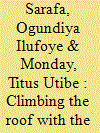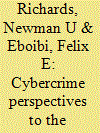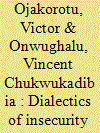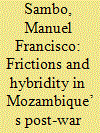|
|
|
Sort Order |
|
|
|
Items / Page
|
|
|
|
|
|
|
| Srl | Item |
| 1 |
ID:
190928


|
|
|
|
|
| Summary/Abstract |
The paper qualitatively examines the role of community policing as a panacea to insecurity in Nigeria through documentary sources. It is argued that the social and political environment in Nigeria is pervaded by the Boko Haram uprising in the North East zone, banditry and cattle rustling in the North West and North Central zones, ethnic militia in the South South and South East zones and armed robbery and ritual killings in the South West zone. Nigeria has become one of the most unsafe places to live in the world, the rate of killings suggesting that the Nigeria Police Force (NPF) – an organisation created for ensuring internal peace and cohesion – has failed in its statutory responsibilities. It is concluded that community policing which ensures the collaboration of citizens with security agents is the right approach to alleviating the internal security crisis in Nigeria.
|
|
|
|
|
|
|
|
|
|
|
|
|
|
|
|
| 2 |
ID:
190929


|
|
|
|
|
| Summary/Abstract |
Cybercrime investigators, in an attempt to rid Nigeria of cybercrime, go about arresting and demanding for digital devices, of unsuspecting members of the public, especially Nigerian youths. Upon seizing these digital devices, they compel the owners to surrender security features to gain access to the devices to fish for cybercrime evidence. The rampant nature of this investigative process partly culminated in the recent ‘ENDSARS’ protests in Nigeria that commenced in cyberspace with the hashtag #ENDSARS NOW. Although the ENDSARS protest has become a topic of discourse in the news, literature, and academic domain, there seems to be limited or no literature on the cybercrime perspectives of the protests. This paper seeks to answer the question: To what extent can cybercrime investigators legally gain access to digital devices and social networks of persons? It concludes that to avoid future protests against cybercrime investigators, implementing a structured cybercrime investigation process in conformity with best practices, as it is done in developed economies like the United States of America, is suggested.
|
|
|
|
|
|
|
|
|
|
|
|
|
|
|
|
| 3 |
ID:
190933


|
|
|
|
|
| Summary/Abstract |
To achieve development in a state of insecurity is a mirage. Africa is caught in this web, as every sub-region faces security challenges. The Millennium Development Goals (MDGs) and the Sustainable Development Goals (SDGs) were developed as frameworks to fast track development in developing countries and sustain it in developed countries through global partnerships. This study is an advocacy to reinvent the role development partners can play to prevent and contain insecurity in the continent. It examines insecurity and development scenarios of countries in Africa, relying on the analysis of secondary data. Based on the triangulation of the Development Partnership Approach and Structural-Functional Approach as the framework for the study analysis, the findings suggest that development partners need to do more to prevent and contain insecurity in the region. The study proposes ways the development partners can achieve these.
|
|
|
|
|
|
|
|
|
|
|
|
|
|
|
|
| 4 |
ID:
190932


|
|
|
|
|
| Summary/Abstract |
It has been about three decades since Mozambique transitioned from a brutal civil war and one-party rule to peace and democracy. Although Mozambique has not relapsed into another large-scale civil war, sustainable peace and democracy in the country have become ever more elusive. In 2013, military clashes between Renamo and the Frelimo-led government resumed and prompted a new peace process, whilst poverty and inequalities are rampant, authoritarianism is on the rise, and an Islamic insurgency erupted in the northern region. Accordingly, while some scholars still praise Mozambique’s post-war peacebuilding as successful, others have claimed that peacebuilding failed. This article evades the binary of successful or failed liberal peacebuilding in Mozambique. Instead, it applies the concepts of friction and hybridity to offer an alternative way of reading the 30 years of peace (building) in Mozambique. The article argues that frictions in values and interests between the international/liberal peacebuilders and local (non-liberal) elites have resulted in a negative and unstable hybrid peace, that is, a precarious peace in Mozambique.
|
|
|
|
|
|
|
|
|
|
|
|
|
|
|
|
| 5 |
ID:
190930


|
|
|
|
|
| Summary/Abstract |
The prospect of extra-terrestrial (outer space) armed conflict between major powers is a real possibility. As early as 1966, an Outer Space Treaty was signed by over 100 countries in response to such a possibility. In 2019, NATO declared outer space a new potential war zone or military operational domain alongside air, land, sea, and cyberspace. This new war zone is mainly a strategic frontier, exclusively dominated by a few global superpowers. It would be naive to think that global superpowers’ wars fought in outer space will not have a detrimental socio-economic effect on non-participating countries. On the contrary, an outer space war will have dire consequences for the developing world, such as South Africa. This article is descriptive and explanatory in nature and analyses the potential risks of a twenty-first-century space war to South Africa's national security. It provides a deeper understanding by contextualising the international legal regulation of the military use of space, the use of force against the architecture of space resources, technological advances in satellite systems and weapons, the current geopolitical tensions between the major superpowers related to space and highlights South Africa's international relations with some of these global superpowers.
|
|
|
|
|
|
|
|
|
|
|
|
|
|
|
|
| 6 |
ID:
190931


|
|
|
|
|
| Summary/Abstract |
The Karamoja Cluster is the epicentre of Africa’s decades-old problem of cattle rustling. Recent reports indicate a rise in livestock theft, despite the unilateral and multilateral interventions of the cluster’s respective governments. Paradoxically, with the deployment of elite and specialised police units – and in some cases even the military – the number of fatalities, frequency of incidences and amount of livestock stolen all continue to increase. Using Baringo, Kenya as a case study, this article investigates why cattle rustlers continue to thrive in the Karamoja Cluster. Police legitimacy theory, frustration–aggression theory and theory of eco-violence were employed and both primary and secondary data sources were used, including interviews with 32 purposively selected respondents. It was found that coercive government responses to cattle rustling have resulted in the perception of police illegitimacy and consequently in non-cooperation between the community and the police. It is recommended that the Karamoja Cluster’s governments re-evaluate their intervention strategies with a view to fostering a positive police–community relationship in the areas most afflicted by cattle rustling, and that they deploy local reservists who are more aligned with local sociocultural dynamics in order to increase community acceptance of and cooperation with the police.
|
|
|
|
|
|
|
|
|
|
|
|
|
|
|
|
| 7 |
ID:
190927


|
|
|
|
|
| Summary/Abstract |
Empirical studies have shown that the use of temporary volunteers to control crime is common in sub-Saharan countries. This study examines the contentious nature of volunteers’ crime control duties along Nigeria’s borders. Using a mixed-method approach, shortcomings in the volunteer scheme’s operation were discovered such as inadequate training, non-hierarchical leadership, poor conditions of service and administrative and technical loopholes that tempted volunteers to become more involved in criminal activity than in crime control. During active service, the volunteers engaged more in economic-related misdemeanours; after being demobilised, they committed felonious offences. Exacerbating factors include the temporary nature of the volunteering, an inability to meet societal and personal demands, a high knowledge of border road networks, closeness to and affinities with known criminals, unemployment and security experience. The use of volunteers in crime control should be halted for multiple reasons, including to reduce leaks about details of security operations.
|
|
|
|
|
|
|
|
|
|
|
|
|
|
|
|
|
|
|
|
|